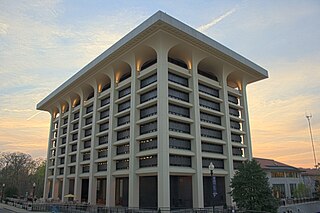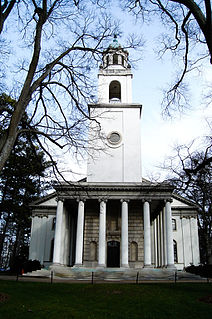Related Research Articles

Methodism, also called the Methodist movement, is a group of historically related denominations of Protestant Christianity whose origins, doctrine and practice derive from the life and teachings of John Wesley. George Whitefield and John's brother Charles Wesley were also significant early leaders in the movement. They were named Methodists for "the methodical way in which they carried out their Christian faith". Methodism originated as a revival movement within the 18th-century Church of England and became a separate denomination after Wesley's death. The movement spread throughout the British Empire, the United States, and beyond because of vigorous missionary work, today claiming approximately 80 million adherents worldwide.

John Wesley was an English cleric, theologian, and evangelist who was a leader of a revival movement within the Church of England known as Methodism. The societies he founded became the dominant form of the independent Methodist movement that continues to this day.

The Holiness movement is a Christian movement that emerged chiefly within 19th-century Methodism, and to a lesser extent other traditions such as Quakerism, Anabaptism, and Restorationism. The movement is Wesleyan in theology, and is defined by its view of personal sin, and emphasis on the doctrine of a second work of grace generally called entire sanctification or Christian perfection. For the Holiness Movement "the term 'perfection' signifies completeness of Christian character; its freedom from all sin, and possession of all the graces of the Spirit, complete in kind." A number of evangelical Christian denominations, parachurch organizations, and movements emphasize those beliefs as central doctrine.

Clark Atlanta University is a private, Methodist, historically black research university in Atlanta, Georgia. Clark Atlanta is the first Historically Black College or University (HBCU) in the Southern United States. Founded on September 19, 1865, as Atlanta University, it consolidated with Clark College to form Clark Atlanta University in 1988. It is classified among "R2: Doctoral Universities – High research activity".
The Freedmen's Aid Society was founded in 1859 during the American Civil War by the American Missionary Association (AMA), a group supported chiefly by the Congregational, Presbyterian and Methodist churches in the North. It organized a supply of teachers from the North and provided housing for them, to set up and teach in schools in the South for freedmen and their children. The AMA founded a total of more than 500 schools and colleges for freedmen in the South after the war, so that freedmen could be educated as teachers, nurses and other professionals.
Christian perfection is the name given to theological concepts within some sects of Christianity that purport to describe a process of achieving spiritual maturity or perfection. The ultimate goal of this process is union with God characterized by pure love of God and other people as well as personal holiness or sanctification. Various terms have been used to describe the concept, such as entire sanctification, perfect love, the baptism with the Holy Spirit, the indwelling of the Holy Spirit, baptism by fire, the second blessing, and the second work of grace.

Circuit rider clergy, in the earliest years of the United States, were clergy assigned to travel around specific geographic territories to minister to settlers and organize congregations. Circuit riders were clergy in the Methodist Episcopal Church and related denominations, although similar itinerant preachers could be found in other faiths as well, particularly among minority faith groups.
Harry Richardson may refer to:
Robert Elijah Jones was an American bishop of the Methodist Episcopal Church and The Methodist Church in the U.S., elected in 1920. Along with Matthew Wesley Clair, Jones was one of the first African-American Bishops of the M.E. Church.

The Interdenominational Theological Center (ITC) is a consortium of five predominantly African-American denominational Christian seminaries in Atlanta, Georgia, operating together as a professional graduate school of theology. It is the largest free-standing African-American theological school in the United States.

Arthur James Moore was an American bishop of the Methodist Episcopal Church, South (MECS), the Methodist Church, and the United Methodist Church, elected in 1930.

West End is an elevated rail station on the Red and Gold lines of the Metropolitan Atlanta Rapid Transit Authority (MARTA) rail system servicing the West End and most of Southwest Atlanta, including neighborhoods bordering Cascade Road and Metropolitan Parkway. The West End station opened on September 11, 1982.

Andrew Warren Sledd was an American theologian, university professor and university president. A native of Virginia, he was the son of a prominent Methodist minister, and was himself ordained as a minister after earning his bachelor's and master's degrees. He later earned a second master's degree and his doctorate.

John Wesley Edward Bowen was born into American slavery and became a Methodist clergyman, denominational official, college and university educator and one of the first African Americans to earn a Ph.D. degree in the United States. He is credited as the first African American to receive the Ph.D. degree from Boston University, which was granted in 1887.

The Atlanta University Center (AUC) Robert W. Woodruff Library is a library in Atlanta which serves the four members of the Atlanta University Center, the world's oldest consortium of historically black colleges and universities and the Interdenominational Theological Center. The library, constructed in 1982, is named for Robert Winship Woodruff, former CEO of the Coca Cola Company. In 2010, the library completed a $16.2 million renovation, partly funded by donations from the Coca Cola Company.

Emory University Libraries is the collective group of academic libraries at Emory University in Atlanta, Georgia, USA. The libraries include the Robert W. Woodruff Library, Woodruff Health Sciences Center Library, Goizueta Business Library, Hugh F. MacMillan Law Library, Pitts Theology Library, Oxford College Library, and the Stuart A. Rose Manuscript, Archives, and Rare Book Library. Since January 15, 2014, Yolanda Cooper serves as Dean and University Librarian for Emory Libraries.

Wesleyan theology, otherwise known as Wesleyan–Arminian theology, or Methodist theology, is a theological tradition in Protestant Christianity based upon the ministry of the 18th-century evangelical reformer brothers John Wesley and Charles Wesley. More broadly it refers to the theological system inferred from the various sermons, theological treatises, letters, journals, diaries, hymns, and other spiritual writings of the Wesleys and their contemporary coadjutors such as John William Fletcher.

The History of Emory University began in 1836 with a small group of Methodists from Newton County contemplated the establishment of a new town and college. The town was called Oxford after the school's prestigious British cousin, which graduated the two founders of Methodism, John and Charles Wesley. The college was named after John Emory, an American Methodist bishop.

The history of Methodism in the United States dates back to the mid-18th century with the ministries of early Methodist preachers such as Laurence Coughlan and Robert Strawbridge. Following the American Revolution most of the Anglican clergy who had been in America came back to England. John Wesley, the founder of Methodism, sent Thomas Coke to America where he and Francis Asbury founded the Methodist Episcopal Church, which was to later establish itself as the largest denomination in America during the 19th century.

Vivian Wilson Henderson was an American educator and human rights activist, and the eighth president of Clark Atlanta University. Vivian Wilson Henderson became President of Clark College in 1963, at the age of 40, where he would serve as president for 10 consecutive years.
References
- ↑ "Dr Harry Van Buren Richardson (1901–1990) – Find A Grave". www.findagrave.com. Retrieved February 12, 2018.
- ↑ "Harry V. Richardson, 1959–1968". Walk Together Children: A History of the Interdenominational Theological Center. Atlanta University Center Robert W. Woodruff Library . Retrieved July 31, 2018.
- ↑ Knotts, Alice G. (November 7, 2013). "Richardson, Harry Van Buren". In Yrigoyen, Charles Jr.; Warrick, Susan E. (eds.). Historical Dictionary of Methodism (3 ed.). Scarecrow Press. p. 310. ISBN 9780810878945 . Retrieved July 31, 2018.
- ↑ Richardson, Harry V. (1947). Dark Glory: A Picture of the Church among Negroes in the Rural South. Friendship Press. OCLC 503943900 . Retrieved February 16, 2018.
- ↑ Hildebrand, Reginald F. (1995). The Times Were Strange and Stirring: Methodist Preachers and the Crisis of Emancipation . Duke University Press. p. xxiv. ISBN 9780822316398 . Retrieved February 15, 2018.
The most comprehensive single volume on the history of black Methodism is Dark Salvation: The Story of Methodism as It Developed among Blacks in America by Harry V. Richardson.
- ↑ Davis, Morris L. (2008). The Methodist Unification: Christianity and the Politics of Race in the Jim Crow Era. NYU Press. p. 153. ISBN 9780814720318 . Retrieved February 15, 2018.
...Richardson's work is considered by many to be the classic overview of African American Methodism. Richardson's book is crucial to understanding the complex variety of African American Methodist institutions and how they have related to each other.
- ↑ Jelks, Randal Maurice (2012). Benjamin Elijah Mays, Schoolmaster of the Movement: A Biography. UNC Press Books. p. 290. ISBN 9780807869871 . Retrieved February 15, 2018.